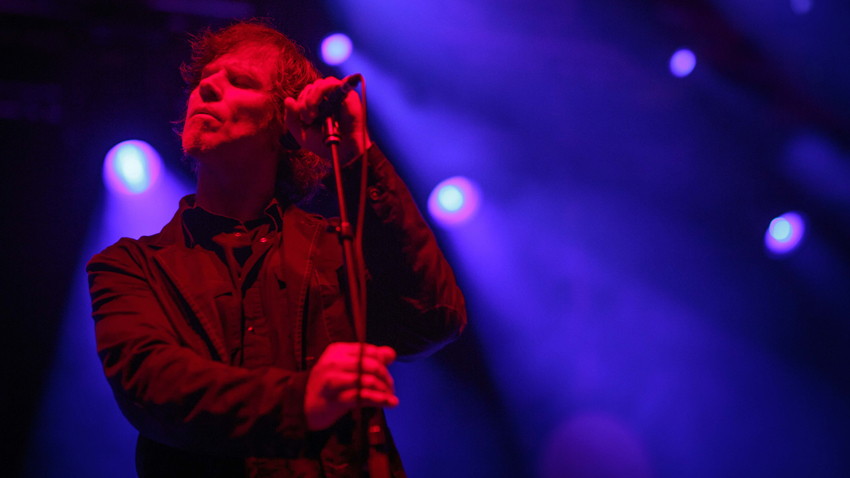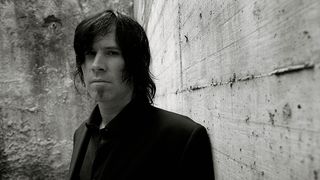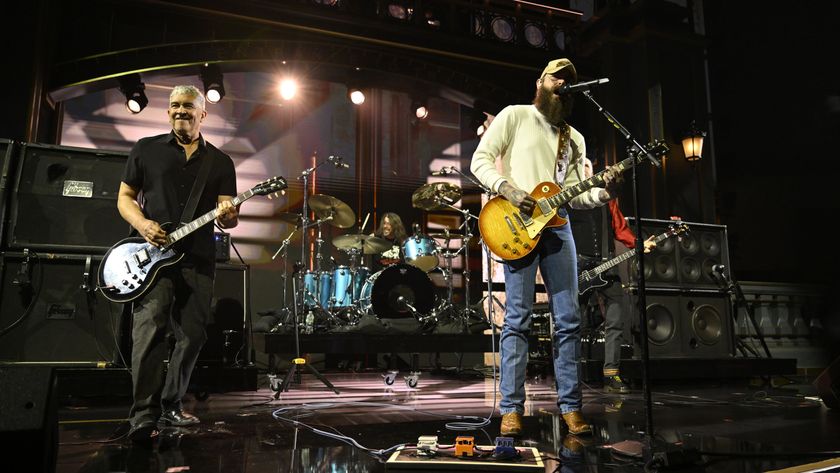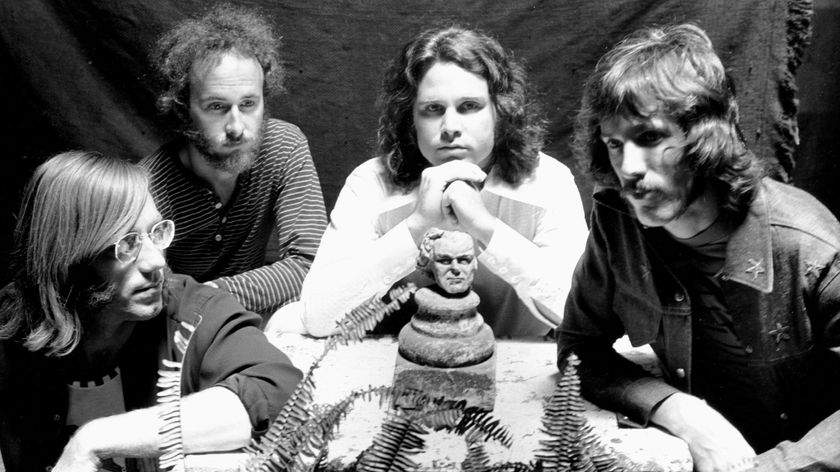Mark Lanegan talks Screaming Trees, Queens of the Stone Age and more
"Even when I'm making my own solo records I'm collaborating"

Mark Lanegan is a notoriously tricky interviewee. The Screaming Trees/Queens of the Stone Age man has a reputation for being a little prickly, so when it quickly becomes apparent that the early morning phone call for our scheduled interview has woken him up, we're bracing ourselves for a rough ride.
"It's a little too early to tell," he replies to our pensive query on how things were going for him over the other side of the Atlantic. Still, early start or no early start, we delve head first into the gruff-voiced frontman's eclectic back catalogue as we discuss serial collaborations, songwriting, Queens of the Stone Age and more.
Your latest collaboration is an album with British multi-instrumentalist Duke Garwood, how did that come about?
"We played a number of shows together over a few years. We became friends and I was a fan of his music so we thought it might be fun."
How did the writing process for the album play out?
"He sent me some ideas and I worked on the ones that I liked. When we got together to actually make the record we had a few days where we worked together."
Another of your collaborations is the Gutter Twins with Greg Dulli - is that project particularly close to heart due to your friendship with Greg?
Get the MusicRadar Newsletter
Want all the hottest music and gear news, reviews, deals, features and more, direct to your inbox? Sign up here.
"Sure. Whenever I've been working on something recently I put my whole self into it. But working with Greg was a lot of fun because it's just another excuse to hang out."
Is that connection key to success when collaboratively making a record?
"It definitely helps."

Mark Lanegan has worked with some of the best in the business (Credit: Corbis)
Do you thrive off the challenge of writing collaboratively with different artists, rather than working in a band setting?
"Well sure. Even when I'm making my own solo records I'm collaborating with people. It keeps things interesting for me."
Your solo albums have featured renowned guitarists playing drums, like Jay Mascis and Josh Homme, why is that?
"All the guys I know that play guitar are also secretly drummers and vice versa. It's just that when I first started making these records it was a low-key affair and I wanted to get people in that were around and were friends of mine. A lot of the time they'd say, 'Hey, have you got the drums on that yet?' And I'd say, 'No, do you want to do them?" It just happened like that."
Is it correct that you yourself started as a drummer?
"No, not really. I worked for these guys, the parents of the guys that were in the Trees, repossessing appliances. If people didn't make their payments I would go pick up a washer or a drier. They had a back room with half of a drum kit in it. A guy traded me for some weed a floor tom and a hi hat and it was decided then that I was the drummer because of that. That didn't really work out."
How did the change to frontman come about?
"Well, the guy that they did have singing could actually play the drums."
Were those your first experiences of writing songs, with Screaming Trees?
"When I first started writing songs it would be a few words here and there. The guitar player wrote songs and I'd just change some words to make it have some kind of meaning to me because a lot of the stuff he was writing was psychedelia but he had never even tripped on acid so it became real cartoonish. So I had to sing these so I tried to have some sort of meaning to me. Tried and failed, I might add. But by the time we got to the last Trees records I was writing and there was a lot more satisfaction in that. It was a learning curve, when I started I didn't know anything about music, singing or writing music. It took me a while and I'm still learning."
Is that a constant learning curve?
"I hope so. I definitely hope so."
Had you become more comfortable in terms of songwriting by the time [1992 Screaming Trees album] Sweet Oblivion came around?
"That record and the one that came afterwards, yes."
While you were still in the Trees you began releasing solo material - was going solo a liberating process?
"[Record label] Subpop suggested that I make a solo record and offered me some money to do it. I was working in a warehouse and by the end of the day I'd think up a song in my head and get a guitar chord book and I'd go home, find the chords and write songs like that. I got my friend Mike Johnson to put intros and middle sections on those songs. And that's how I did that."
Do you ever revisit your early work? You don't seem like the kind of guy that would sit at home and listen to your own music
"Only if I'm getting ready to go on a tour and I've decided to play some obscure tracks that I haven't played in a long time, or sometimes ever. So only when I'm trying to find a track will I go back and I'll usually just listen to that specific track."
Lanegan performing with Queens Of The Stone Age
Of course you've also worked with Queens of the Stone Age for several albums - was that another case of just working with friends?
"It was just being friends and hanging out and being asked to do stuff and then being able to do it. There's no mystery to it."
Is that an inspirational bunch of guys to work with?
"I enjoy working on whatever I'm working on. I definitely enjoy working with Josh, he's a good friend of mine, he's another guy I hang out with a lot when I'm not making music. We have a lot of laughs working together, so in that way it is inspiring."
And they have a new album on the way, is there more from you and Queens to come in the future?
"I sang a little bit on this new record. Josh and I are always doing stuff, but I don't have a crystal ball, I can't tell you what the future holds. But I do know that we enjoy working together and we continue to do so."
Yet another collaboration - you have released three acclaimed albums with Isobel Campbell. How did that partnership come about?
"She contacted me through my record company looking for somebody to sing on a song she had. I did it, we met and became friendly and then talked about making more music."
Was there an instant musical connection between the two of you?
"I was a fan of what she did before we ever met. It was something I enjoyed doing and I was happy to do. She would write the songs and I sang them."
As you've said you don't have a crystal ball, but could you work with Isobel again?
"It's tough telling. We did an awful lot in a short period of time. If that were to happen I'm sure it wouldn't happen any time soon, but you never can tell what might happen."
And finally, as a songwriter, are you happy for people to attach their own meanings to your songs?
"I can't say what people use the experience of listening to songs for, but I would never tell somebody what it is supposed to mean. That defeats the purpose of making it. Hopefully whoever connects with it connects with it in their own way and it can mean whatever it is supposed to mean to them."
Rich is a teacher, one time Rhythm staff writer and experienced freelance journalist who has interviewed countless revered musicians, engineers, producers and stars for the our world-leading music making portfolio, including such titles as Rhythm, Total Guitar, Guitarist, Guitar World, and MusicRadar. His victims include such luminaries as Ice T, Mark Guilani and Jamie Oliver (the drumming one).

Post Malone fronting Nirvana, Miley Cyrus channels Sinéad O’Connor, David Byrne and Robyn, Lady Gaga joins The Lonely Island… SNL’s 50th anniversary weekend had something for everyone

“Crafted for the true metal enthusiast, this axe embodies the soul of legendary guitarist Zakk Wylde”: Paging all “shred warriors,” Wylde Audio’s Berzerker takes the shape of metal guitars to new extremes
Most Popular







